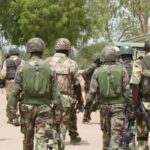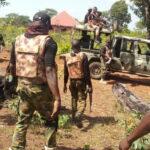Jennifer Ukambong Samuel, the Plateau State indigene and aid worker attached to Alliance for International Medical Action (ALIMA), who was abducted alongside eight others in the Northeast last December and recently released has arrived her family house in Jos, the state capital.
Her arrival sparked jubilation among her family members, nursing-colleagues, friends, neighbours, the government and many Plateau indigenes.
Recounting her experience in captivity, she said it was a miracle to be released and alive because others whom she met in captivity were still there.
She said she was abducted along Borno-Monguno road enroute Jos at about 8 o’clock in the morning by the insurgents in military uniforms after stopping several other cars, profiling occupants of the cars, releasing some, shooting some others on the tarred road, for reasons unknown to her, before leading the rest of them into the bush and then transiting to the camp.
“While in captivity, the insurgents shoot their gun shots from time to time outside the zinc rooms to make us know that they are around. We were provided with food stuffs to cook ourselves, and we did. There is no meat but we were given dry fish to use for the cooking.
“They come around from time to time to ask us if we need anything. The first week, we were under lock and key, but from the second week we can come out of the rooms into a fenced compound that has tree leaves as carmouflaged roof.
“All cooking ends on or before 5pm and we all return to our rooms, using a torchlight which they provided us in the room till morning. I and the others only eat once a day because we do fast and pray for our safety, but we never allowed them to know that we were fasting. At a point, I made up my mind that whatever happens to me, so be it.
“We were not sexually abused, but they kept preparing our minds psychologically for eventual marrying-off to someone else if need be, and they made us to believe that their belief allow such.
“When news began to filter in that some of us might be released, I did not believe until it happened.
“During the course of my captivity, we were taken to three different locations, passing through forests, criss-crossing tarred roads intermittently and crossing different rivers.
“They know all the bush paths/forests and they often use GPRS to know where they were heading. On the day of our release, we travelled for 26 hours in the car (from 3pm-5pm the next day) before we were freed,” she said.
She said she did not see Leah Sharibu, the only remaining girl in captivity of the 110 schoolgirls abducted by insurgents from the Government Girls Science and Technical College in Dapchi, Yunusari Local Government Area of Yobe State.
But she said she was told by Alice, who has also being in captivity for about two years now that Leah is doing fine. Asked whether she saw the Chibok girls, she said she didn’t.
According to her, the reason why Alice was still held back was because negotiation for her release between the insurgents and the government broke down and the insurgents felt the government was not serious.
Jennifer said she would not mind returning to Northeast to continue her humanitarian work, pointing out that what happened to her was one of the hazards of the job.
She called for prayers for those still in captivity, saying that divine intervention was needed so that God in his miraculous way should make them regain freedom.

 Join Daily Trust WhatsApp Community For Quick Access To News and Happenings Around You.
Join Daily Trust WhatsApp Community For Quick Access To News and Happenings Around You.


